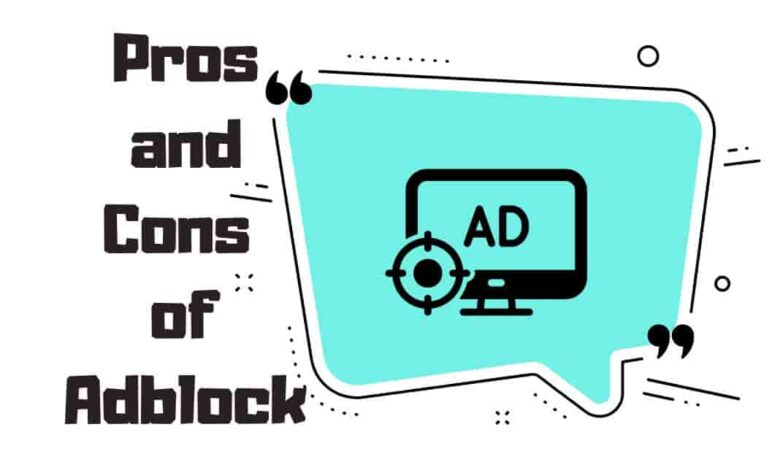Pros and Cons of Adblock: Is It Worth Using in 2023?

The internet has become an essential part of our daily lives in the information age. As we navigate through countless websites and consume online content, we are often bombarded with advertisements that can sometimes disrupt our browsing experience. This is where AdBlock software comes into play. In this comprehensive article, we will discuss the pros and cons of Adblock and shed light on its importance in today’s internet age.
What is Adblock?
Adblock is a software or browser extension that blocks and filters website ads. These tools, such as Adblock Plus and AdBlock, work by analyzing the content of web pages and preventing advertisements from loading.
This includes pop-ups, banner ads, and third-party trackers collecting behavior data. AdBlock software aims to provide users with a cleaner and more enjoyable online experience by blocking ads.
The Importance of Adblock in Today’s Internet Age
With the rapid growth of the internet, online advertising has become a major source of revenue for creators and publishers. However, as the number of website ads has increased, so needs a more pleasurable internet browsing experience. This is where AdBlock software offers an ad-free web surfing experience and a way to reclaim control over their online activity.
Pros of Adblock
Adblock software has gained significant popularity among internet users, primarily due to its numerous Pros. This section will delve into the key benefits of using Adblock software and how it can positively impact your internet browsing experience.

Provides a Cleaner and Faster Browsing Experience
One of the most significant benefits of using Adblock software is its enhanced browsing experience. By block ads, individuals can enjoy web pages without the clutter of banners, pop-ups, and other ad formats, which often detract from the actual content. Additionally, Adblock can improve loading times, providing users with a faster and more efficient online experience.
Prevents Exposure to Intrusive Ads
Intrusive ads can be annoying and disruptive to the user experience. Pop-up windows, autoplay videos, and ads with loud audio can detract from the enjoyment of browsing sites.
Adblock software filters out these intrusive ads, enabling individuals to focus on the content they wish to consume without being bothered by unwanted distractions.
Protects Against Potential Malware & Phishing Scams
Adblock software can serve as a protective barrier against malicious software and phishing scams. Adblock helps reduce the risk of exposure to malware and phishing attempts by filtering out ads and scripts from third-party servers. This added layer of safety is particularly beneficial for individuals who may not be well-versed in identifying and avoiding such threats.
Helps Save on Data Usage
For mobile users with limited data plans, Adblock software can be valuable in conserving data usage. Online ads, especially those with high-quality images and video content, can consume significant data.
By blocking these ads, Adblock allows individuals to save on data usage and potentially avoid overage charges from their mobile service providers.
Cons of Adblock
While Adblock software has numerous benefits, it’s crucial to consider the potential cons associated with its use. Understanding these disadvantages can help users make an informed decision about whether or not to employ an ad-blocking package.

Blocking All Ads, Even Non-Intrusive & Relevant
Adblock software blocks all ads indiscriminately, including non-intrusive and relevant to the user. As a result, users may miss out on useful information or offers that may interest them.
Furthermore, this can hinder the connection between content providers and their target audience, as relevant advertising can be a valuable means of communication.
Reduced Revenue for Creators & Publishers
creators often rely on advertising revenue as their primary source of income. By using Adblock software, users directly impact these creators’ revenue streams, which can lead to reduced quality and quantity.
This can be particularly detrimental to smaller publishers and independent creators who may struggle to find alternative sources of revenue.
Paywalls & Limited Access Consequences
To compensate for lost advertising revenue, some sites may implement paywalls or limit access to content for users with ad-blocking packages.
This can frustrate users accustomed to accessing free content and may create a barrier between creators and their audiences.
Impacts on the Free Internet Economy
Online advertising is a significant driving force behind the free Internet economy. By supporting creators through ads, users can access information and entertainment without paying directly.
However, the widespread use of Adblock software can threaten this model, potentially leading to a shift toward subscription-based services or other revenue models that may be less accessible or appealing to users.
Alternatives to Ad blockers
While Adblock software offers numerous benefits, it’s essential to consider the potential negative consequences for creators and the broader Internet ecosystem.

Given these drawbacks, users may want to explore alternative options to ad-blocking package that balances a smooth browsing experience and supporting content providers.
Alternative Options to Adblock
There are several alternative approaches to managing online ads that can help minimize their impact on user experience without eliminating advertising revenue for content creators. These options range from non-intrusive ad formats to direct support for content providers.
Examples of Non-Intrusive Ad Options
One alternative to using Adblock software is seeking out and promoting non-intrusive ad formats. These may include native advertising, sponsored content, or display ads that are well-integrated into the website’s design and do not obstruct the user experience.
By encouraging the adoption of these more user-friendly ad formats, users can help support their favorite sites while enjoying an enjoyable browsing experience.
Some ad-blocking package, such as Adblock Plus, offers an “Acceptable Ads” program that allows non-intrusive ads to be displayed. This feature enables users to support creators without sacrificing their browsing experience entirely.
Direct Support for Content Creators
Another alternative to Adblock is supporting creators directly through donations, subscriptions, or other means. By providing financial support directly to publishers and creators, users can help ensure the sustainability of their favorite sites and access ad-free content.
Platforms like Patreon, Ko-fi, and SubscribeStar allow users to support creators with regular financial contributions in exchange for exclusive content, ad-free browsing, or other benefits. Additionally, some sites offer ad-free subscription plans, enabling users to contribute to the site’s revenue while enjoying an ad-free browsing experience.
By considering these alternatives to Adblock software, users can balance enjoying a pleasant online experience and supporting the content providers they value.
Adblock and the Ad Industry
The widespread use of Adblock software affects creators and publishers. It has significant implications for the advertising business as a whole. In this section, we will discuss the potential impact of the ad-blocking package on the advertising business and explore the role of advertisers in addressing the AdBlock debate.

Adblock’s Influence on Advertising Industry
Adblock software can potentially disrupt the advertising industry’s traditional revenue models by reducing ad impressions and decreasing click-through rates.
As more users employ ad-blocking tools, advertisers may face challenges in reaching their target audiences and generating a return on their advertising investments.
Moreover, the rise in ad-blocking package usage can shift advertising strategies, pushing advertisers to explore new formats and channels less susceptible to ad-blocking technologies. This may include native advertising, sponsored content, and influencer marketing.
Advertisers’ Role in Adblock Discussion
Advertisers play a crucial role in addressing the AdBlock debate. Their practices can influence users’ perceptions of online ads and their willingness to install ad-blocking packages.
By prioritizing non-intrusive ad formats, adhering to ethical advertising standards, and respecting user privacy, advertisers can contribute to a more positive online experience and reduce the need for ad-blocking tools.
Additionally, advertisers can engage in open dialogues with creators, publishers, and users to better understand the concerns surrounding online advertising and work together to develop more user-friendly advertising solutions.
Advancing Relevant & Personalized Advertising
Advertisers are increasingly focusing on delivering more relevant and personalized advertising experiences to counter the growing trend of ad-blocking package usage.
By leveraging data and technology, advertisers can create ads that cater to users’ interests, needs, and preferences, increasing the likelihood that users will engage with the advertising content.
As the advertising business evolves in response to the rise of Adblock software, it’s essential for all stakeholders – including creators, advertisers, and users – to work together to balance providing a pleasant online experience and supporting the financial sustainability of the internet ecosystem.
Adblock and Data Privacy
Data privacy is a growing concern for many internet users, and Adblock software can play a role in addressing these concerns. In this section, we will discuss the potential impact of Adblock on data privacy, the part of data collection in online advertising, and the importance of user consent and transparency in data collection practices.

Effect on Data Privacy
Adblock software can help protect users’ data privacy by blocking third-party trackers, scripts, and cookies that collect personal information.
Users can maintain more control over their online activity and personal information by reducing the amount of data collected by advertisers and other online services. Some ad-blocking tools offer additional privacy features, such as tracker-blocking and anti-tracking capabilities.
Data Collection’s Impact on Online Advertising
Data collection plays a significant role in online advertising, enabling advertisers to deliver targeted and personalized ads based on users’ browsing habits, preferences, and demographic information.
While this can result in more relevant advertising experiences, it raises data privacy and security concerns. The rise of ad-blocking software reflects, in part, users’ desire to protect their personal information from potential misuse.
User Consent & Transparency in Data Collection
It is crucial to prioritize user consent and transparency in data collection practices to address data privacy concerns while maintaining the benefits of targeted advertising.
Advertisers and content providers should inform users about the data they collect and how it is used, providing options for users to opt-in or out of data collection activities.
By fostering trust and respecting users’ privacy preferences, the online ecosystem can evolve better to accommodate both user experience and content creators’ needs.
Frequently Asked Questions
What is Adblock, and How Does it work?
Adblock is software that blocks ads from being displayed on sites, often in browser extensions or apps. It filters out ad-related scripts and elements, providing users with a cleaner, faster browsing experience. Adblock can improve media literacy and enhance the design systems of sites by eliminating intrusive ads.
Can Adblock be Disabled for Specific Websites?
Yes, most blockers allow users to disable their functionality for specific sites. Users can support their favorite creators while benefiting from ad-blocking features on other sites. This selective approach can be essential to responsible media education and usage.
Is Adblock Legal?
Adblock software is legal to use. However, some websites may request or require users to disable their blockers to access the content. Ad blocker can be seen as a personal choice to improve the online experience. Still, it’s essential to consider the potential impact on creators and the advertising business.
Can Adblock prevent me from Accessing Certain Web Pages?
Some websites may detect the use of ad blockers and restrict access to content for users with ad-blocking software enabled. In these cases, users may need to disable their ad blocker or add the website to a whitelist to access the site’s content. It’s essential to balance a pleasant browsing experience and supporting content providers.
Can Adblock Protect Me From All Types of Malware?
While ad blockers can help protect users from some types of malware and phishing scams associated with malicious ads, they are not a comprehensive security solution. It’s essential to use additional safety measures, such as antivirus software and secure browsing practices, alongside adblockers to ensure a safe online experience.
Conclusion
Adblock software has both positive and negative effects on the online ecosystem. While it can provide a faster and cleaner browsing experience, it can also decrease creators’ revenue and impact the free internet economy.
To balance ensuring a pleasant user experience and supporting creators, users can explore alternative options, such as non-intrusive ad formats or directly supporting creators.
To achieve a more sustainable online ecosystem, all stakeholders must collaborate and consider the pros and cons of ad blocking software.

